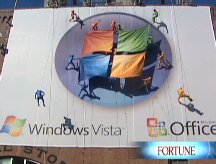Big Blue's big plan
IBM is drooling over the coming infrastructure boom.
 |
| CEO Sam Palmisano has IBM working on large-scale projects all over the world. |
(Fortune Magazine) -- "We've been given this on a silver platter," says Sam Palmisano, CEO of IBM. "We might as well use it as an opportunity."
Believe it or not, the leader of Big Blue is talking about the financial crisis and the prospect of systemic overhaul. As companies around the globe try to get ahead of the economic maelstrom by laying off employees, shuttering factories, and cutting R&D, IBM (IBM, Fortune 500) is headed in another direction.
In the face of a meltdown, Palmisano continues, "you can retrench, pull in your horns, protect the balance sheet, and preserve cash. Or you can realize that this is about humanity screaming for change."
What kind of change? The planet is buckling under the weight of snarled traffic, wasted energy, toxic emissions, poor distribution of food and water, and insufficient health care.
Palmisano thinks all those dilemmas are connected in one important way: They're the result of dumb underlying networks. Traffic bogs down because of overwhelming demand at peak hours. Health care suffers from the lack of a universal database of symptoms and diagnoses. Add intelligence to the networks, and the problems will go away.
It's not an altruistic notion. As speculation swirls that the Obama administration may invest in a "new New Deal" to stimulate the economy, Palmisano is positioning IBM as a leader in infrastructure overhaul. In fact, he's been preparing for this juncture for a while now.
In the past five years Palmisano has sold off marginal businesses like PCs and redirected the company's $6 billion annual R&D budget toward the "Smarter Planet" initiative, which focuses on inserting sensors into massive networks, such as the electricity grid, and making sense of it all through data analytics software.
IBM has also adjusted its M&A strategy to follow suit. Its biggest acquisitions of late - Cognos, FileNet, and PricewaterhouseCoopers - have all added to the technology giant's already formidable data acquisition, analysis, and consulting capabilities.
Such investments have allowed IBM to create, for example, food-tracking systems using tiny radio transponders. Last year it rolled out Stockholm's congestion-pricing traffic system after a seven-month pilot program reduced air pollutants by 12%, inner-city greenhouse gases by 40%, and gridlock by 20%. IBM didn't work on that system alone; it had almost 30 partners. But it was a leader, and it subsequently won the right to redo London's system.
In energy IBM has co-developed "smart meters" that reveal electricity-use patterns. Merely showing consumers a cheaper time to do a load of laundry, it turns out, can reduce consumption by up to 15% and lessen peak demand by 10%.
The company has also introduced grid-monitoring programs in India. According to Michael Valocchi, the head of IBM's intelligent utility practice, one Indian utility was losing 47% of all generated power to "splicing" - that is, consumers and companies literally stealing electricity by tapping transmission lines. By putting sensors around the grid, IBM cut those losses to 21%. Now, rather than building new power plants, the Indian utility is focusing on improving existing ones - which is good for everyone.
Palmisano knows IBM isn't alone in drooling over big infrastructure projects. In tech, Hewlett-Packard (HPQ, Fortune 500), Oracle (ORCL, Fortune 500), and SAP (SAP) all stand to benefit too. The same goes for the likes of GE (GE, Fortune 500).
"These are global issues and huge opportunities," Palmisano says. "Someone has to step out and take the lead. But we'll never do it by ourselves." ![]()
-
 The retail giant tops the Fortune 500 for the second year in a row. Who else made the list? More
The retail giant tops the Fortune 500 for the second year in a row. Who else made the list? More -
 This group of companies is all about social networking to connect with their customers. More
This group of companies is all about social networking to connect with their customers. More -
 The fight over the cholesterol medication is keeping a generic version from hitting the market. More
The fight over the cholesterol medication is keeping a generic version from hitting the market. More -
 Bin Laden may be dead, but the terrorist group he led doesn't need his money. More
Bin Laden may be dead, but the terrorist group he led doesn't need his money. More -
 U.S. real estate might be a mess, but in other parts of the world, home prices are jumping. More
U.S. real estate might be a mess, but in other parts of the world, home prices are jumping. More -
 Libya's output is a fraction of global production, but it's crucial to the nation's economy. More
Libya's output is a fraction of global production, but it's crucial to the nation's economy. More -
 Once rates start to rise, things could get ugly fast for our neighbors to the north. More
Once rates start to rise, things could get ugly fast for our neighbors to the north. More








